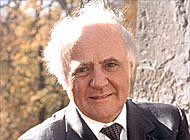The man who changed Neuchâtel bows out

At the age of 67, Karl Dobler still has an impish appeal. His jovial looks, white hair and cheery nature are enough to charm most people.
But scratch the surface and there’s a different Karl Dobler, a man who has worked hard to achieve success over the past 20 years in attracting hundreds of foreign businesses to canton Neuchâtel.
Dobler, who hails from Appenzell and describes himself as a “fighter” and a “born optimist”, is now retiring from his job as industrial representative of the Neuchâtel government.
When he was called in to try to promote the local economy, the canton’s population was anything but positive about the job situation.
“I came to canton Neuchâtel when the watch crisis was at its highest. What I faced was a very downbeat mood but a few courageous personalities from politics and the economy were ready to fight and take up the challenge,” he told swissinfo.
Dobler faced two choices. He could, as he puts it, either withdraw to an Ivory Tower, developing theories and a large administration or he could look for an approach directly in the market place, speaking to investors, managers and bankers.
Needless to say, he chose the latter, starting a campaign to argue the case for foreign businesses to base their European operations in Neuchâtel. The rest, as all success stories say, is history.
During the last 20 years, more than 500 companies from the United States, Germany, France, Britain, the Netherlands, Sweden, Italy, Japan, Australia, Hong Kong, Singapore, South Korea, India and South Africa have started activities through the canton’s incentive programme.
Dobler is particularly pleased that he managed to attract such names as Silicon Graphics, Autodesk, Baxter, and Johnson and Johnson to the canton. But other well-known companies such as Reed Elsevier, Bulgari, Gucci and Serono now also have operations in the canton.
“We had very little money and very little time at the beginning,” he recalls. Using his experience in the United States and later as chief legal adviser and general secretary at Landis and Gyr, and a spell at Motor Columbus, Dobler set about to sell the canton.
“I always remember my first project. I was very nervous. I had to go to the airport at La Chaux-de-Fonds to meet Berthold Weinig from the German woodworking machinery company of the same name,” he said.
“After the deal had been struck and we’d had a few beers, I realised just how important human relationships are in realising projects,” he told swissinfo.
However, there have also been setbacks, with one company in particular, Medtronic, choosing to set up activities in neighbouring canton Vaud at the last minute.
Dobler told swissinfo he could not argue against the proximity of Lausanne’s university hospital nor the shorter distance to Geneva airport.
Not everyone in Switzerland believes that Dobler has achieved success without a high price. His critics argue that canton Neuchâtel has carried out a policy of tax dumping to attract big names.
Dobler sees this criticism as a sign of success, although he takes his critics seriously. “Tax incentives here are clearly within the limits of the law. The incentive programme is not determined by my imagination but by the international market,” he told swissinfo.
He also sees the positive side of it. “Being criticised is stimulating. It encourages us to look for ways of doing better,” he argues.
Dobler has every reason to be satisfied when it comes to looking at the cost/benefit ratio of promotion activities in Neuchâtel.
He estimates that his office and promotion operations cost around SFr4 million a year, with the canton giving financial incentives worth another SFr 5 to 10 million.
The companies concerned and their employees pay back SFr70 to 100 million a year in taxes.
“With a cost of SFr4 million and a result of SFr100 million every year, my price/earnings ratio beats that of the best Swiss companies,” he says.
The Neuchâtel of 2001 is a far cry from the Neuchâtel of 20 years ago. “Not Mao but the Neuchâtel economy has made the long march from the past to the future,” he says.
“That means we have taken the step of traditional mechanics to high tech, electronics, hardware, software, telecommunications and medical devices. We have taken the steps from chocolates to biotechnology, cosmetics and pharmaceuticals, and we have developed from watches to luxury products,” he adds.
He says the result is not just about companies, money and technology. “It’s the people, the new business community which is much younger, much more technology and market driven and much more international.”
“It is this community which is giving the most dynamism and the most constructive impulses to Neuchâtel,” he says.
When Dobler finally empties his office in Neuchâtel, he will not sit back in an armchair and put his feet up. He says there is still plenty of work to do promoting not only Neuchâtel but also other parts of Switzerland.
There is one very good reason why, for the time being, he still occupies his office in a building close to Neuchâtel’s University Church and Castle.
“I still have to write the annual report,” he quips.
by Robert Brookes

In compliance with the JTI standards
More: SWI swissinfo.ch certified by the Journalism Trust Initiative








You can find an overview of ongoing debates with our journalists here . Please join us!
If you want to start a conversation about a topic raised in this article or want to report factual errors, email us at english@swissinfo.ch.